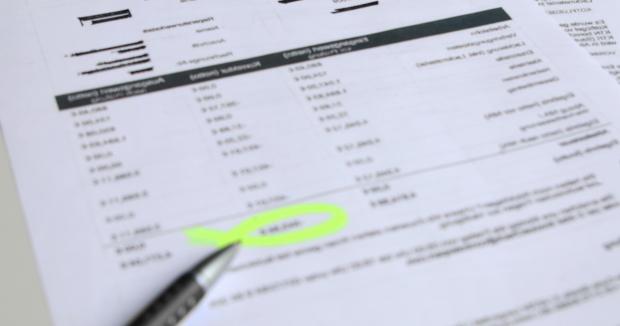Basically, fleet managers naturally aim to reduce accidents and damage to company cars as much as possible. However, they obviously only have a limited influence on the behavior of employees or car drivers. However, in order to increase this at least a little, you can impose deductibles on company car users if they damage the company vehicle, whether as a result of an accident or another incident. However, there are certain requirements and regulations that must be observed. The following article explains what these are.
Deductible for more careful behavior
If a deductible is agreed for the users of company cars, this is a popular way to reduce the frequency of damage in the fleet. Some company car drivers otherwise treat the vehicles quite carelessly, which manifests itself, for example, in frequent parking damage. However, if employees know that they will be asked to pay if the vehicle is damaged, this usually leads them to handle their car much more carefully and responsibly.
It is possible to impose a deductible in accordance with labor law requirements when claiming against employees if they damage the company's property. However, company car insurance also plays a role in this issue - it is not always possible to agree on a deductible
How can a deductible be agreed?
Basically, it is not particularly complicated to agree on a deductible for damage caused to pool or company vehicles. All that is required is a corresponding contractual agreement. If the company uses individually assigned company cars, the transfer of use agreement is suitable for incorporating the corresponding regulations. The equivalent to this for pool vehicles is the general usage agreement.
Incidentally, these contracts are particularly easy today with a contemporary one Fleet management software manage and organize. However, if the employer unilaterally specifies such a contractual agreement for the employees, the standard for the general terms and conditions must also be taken into account with regard to their effectiveness. It is not uncommon for employees to try to defend themselves against the deductibles imposed on them, which often ends in court proceedings.
When is a deductible generally possible?
Whether employees can generally be required to pay a deductible in the event of damage or accidents involving company vehicles depends primarily on the type of insurance for the vehicles. Are they only covered by liability or is there partial or fully comprehensive insurance? The decisive factor is what deductible the respective insurance contract stipulates. The insurance contract is concluded only between the employer and the insurance company. The employee initially plays no role in this. It is therefore important to take labor law requirements into account when it comes to passing on the deductible provided for in the insurance contract to employees.
If the company cars only have liability insurance, there is generally no possibility of transferring the deductible to the employees or the drivers of the vehicles. Deductibles in liability insurance contracts are usually agreed to reduce the monthly insurance premiums, which is why transferring them is not possible. However, the situation is different with partial and fully comprehensive insurance. How high the deductible is is clearly stated in the relevant insurance contracts. It makes sense to include the transfer of the deductible when drafting the transfer agreement. Nevertheless, fleet managers should always seek legal advice in this context.
The amount of the deductible for company car users
Of course, it is also interesting to know how high the deductible can actually be for company car users. There is often an assumption among fleet managers that the amount of the deductible is the decisive factor in determining whether the regulations are ineffective or effective. However, this is only partially true. For example, it is easily possible to require company car users to pay a deductible of EUR 500 in the event of accidents or damage to the company car. The Hamburg Labor Court has already determined this. According to the court, this sum would not represent an unreasonable burden for the employee.
The judges also said that the regulations do not only apply to accidents that are entirely your own fault. The question of guilt must be clarified by the respective insurer, as they have the necessary professional expertise. However, as soon as the fully comprehensive insurance pays, the deductible also becomes due, which can then be transferred to the employee. However, the employer must bear the costs for insurance and upgrading the damage classes. This shows that a conventional deductible with a level that is usually between 500 and 1.000 can be expected of the employee.
The role of employee liability in self-insurance
However, due to the general terms and conditions, a deductible can prove to be ineffective anyway. For example, it represents an unreasonable disadvantage for the company car user if the regulation deviates significantly from employee liability. However, the employee will not be unreasonably disadvantaged if it is clearly stated in the transfer agreement that the costs of the insurance will be borne by the employer, but that the deductible will be passed on to the beneficiary of the vehicle in the event of damage. What is important, however, is that the liability of the company car user is not always required, regardless of whether he is fully at fault for the accident or not.
In this case it would again be an unreasonable disadvantage. The amount and basis of liability must always be based on the principles for internal compensation for damages. These are specified by the Federal Labor Court. Liability then always depends on who is responsible for the damage. For fleet management, this means that they must research the cause of the accident in detail so as not to transfer the deductible in an undifferentiated and blanket manner. It therefore always depends on the individual case.
Waiver of deductible has an impact on income tax
However, practice in most companies shows that the deductible for company car users is often only threatened. It is usually not implemented in the event of damage. However, this employer generosity has an impact on payroll taxes.
The waiver means a financial advantage for the employee. The One percent rule does not apply to this. The deductible that the employee has saved must be correctly recorded for tax purposes as wages. If the claim for damages in the form of the deductible is not entitled to be deducted under the category of business expenses, the tax burden will increase.
That wasn't it yet.
Planned changes to the law, traffic violations, current regulations in the area of the STVO, etc.? You can find everything about this in the category "Test sites, laws, offenses, information".
 tuningblog.eu Your magazine about tuning the car
tuningblog.eu Your magazine about tuning the car






